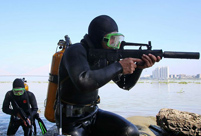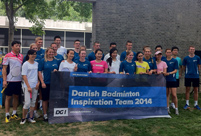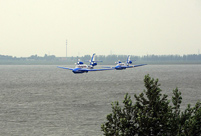 Happy life in Xinjiang
Happy life in Xinjiang
 2014 China Hainan Int'l Automotive Exhibition kicks off
2014 China Hainan Int'l Automotive Exhibition kicks off
 Collection of 'China Dream' public-spirited ads
Collection of 'China Dream' public-spirited ads
 The silent holy stones
The silent holy stones
 University students take care of giant pandas
University students take care of giant pandas
 Leading lady a true legend
Leading lady a true legend
 China Pan-Asia Stone Expo held in Kunming
China Pan-Asia Stone Expo held in Kunming
 Taiwan woman marries into Kazak family, 100 sheep plus a flat as dowry
Taiwan woman marries into Kazak family, 100 sheep plus a flat as dowry
 College girls take graduation photos under water in Chongqing
College girls take graduation photos under water in Chongqing
 Cartoon: Xi and football
Cartoon: Xi and football
ATHENS, July 10 -- The expansion of Greek-Chinese collaboration on marine science and technology is of crucial significance for both sides, a leading Greek scientist on marine research told Xinhua in a recent interview.
Vasilis Lykousis, vice president of the Hellenic Center for Marine Research (HCMR), the national laboratory of Greece on oceanography and marine research, said that the collaboration in this area within the strategic partnership will undoubtedly be for mutual benefit.
In the aftermath of the China-Greece Marine Cooperation Forum held in Athens in June during the official visit of Chinese Premier Li Keqiang, Lykousis gave Xinhua a tour at HCMR's headquarters in Athens' southern seaside suburb to discuss the prospects of Sino-Greek collaboration in this field.
"I think cooperation with China is the best chance of cooperation which has appeared for us in the past 10 years," Lykousis said at his office with a view to the Saronic Gulf.
He regarded the forum as a "very good step forward" and "a very good chance" for the two countries to explore opportunities to work together in marine science and technology.
The first Greece-China workshop on Marine Science and Technology Cooperation was also held in Athens on June 20-21 during the official visit of the Chinese premier.
Lykousis looks forward to the second workshop which will be held most likely in late 2014 or 2015 in China.
As an ancient maritime nation with a century-old background in marine research, Greece has much experience to bring into this new aspect of bilateral cooperation.
For Lykousis there are several advantages for China to cooperate with Greece in this new chapter. The most important is that "Greece will be a strong cooperator from the European side," a sort of gateway to European scientific research projects for Chinese experts.
The latest EU framework program for research and innovation "Horizon 2020" cleared the way, since for the first time Europe opens cooperation in the field to third-party countries, said Lykousis.
"Horizon 2020" is the biggest EU research and innovation program ever, with nearly 80 billion euros (about 109 billion U.S. dollars) of funding available over seven years (2014 to 2020), in addition to the private and national public investment.
"The Horizon 2020 framework provided for the first time a large window of cooperation opportunity among Greece, China and Europe in this field," the Greek expert stressed.
For Greece, the benefits of collaboration with Chinese institutes "which are in a very high level," according to Lykousis, are "obviously of great importance."
The Greek expert and his team at HCMR have concrete ideas regarding the first steps in Greece-China cooperation in the field.
One idea under discussion is to have common research with a Chinese institute in the eastern Mediterranean Sea with vessels and remotely operated underwater vehicles (ROVs) in unexplored sites of major interest in terms of biodiversity and new energy sources.
Another proposal is to provide some of HCMR's innovative instruments for research projects in the South China Sea. Lykousis referred as an example to a sensor measuring solid suspended materials that can go deep down to 3,000 meters and used in the 2010 oil spill accident in the Gulf of Mexico.
The third suggestion is to promote cooperation on forecasting and modeling weather and climate in the sea.
In Lykousis' opinion, with regard to bilateral collaboration, multidisciplinary is the comparative advantage of the HCMR over other western centers.
He explained that in HCMR all marine research is concentrated in one center, which is a plus in comparison to other western centers, since marine research is a multidiscipline field.
Established in 2003 through the merger of previous institutes, HCMR's work in premises across Greece covers the entire spectrum from basic science to technological research in Oceanography, Marine Biological Resources and Inland Waters, Aquaculture, Marine Biology and Genetics.
HCMR scientists carry out large scale experiments in the sea, measure environmental parameters, explore the seafloor, find ancient wrecks and submerged cities, help the Greek state with tsunami hazard mitigation and protection of Greece's beaches.
The center also focuses on the study of the evolution of fish populations, development of feed for fish, training of graduate students, dissemination of information to the public, and charters its vessels and equipment for specialized studies.
HCMR's fleet currently consists of three research vessels, namely AEGAEO, PHILIA and ALCYON, the submersible THETIS and four ROVs. The largest ROV has the ability to dive to about 2,000 meters compared to the submersible which can accommodate a crew of two with an operational depth of 620 meters.
HCMR's activities extend across the Mediterranean Sea, the Black Sea and the Red Sea. AEGAEO for example is currently in the Red Sea working with Saudi Arabia in research regarding corals.
So far HCMR scientists have been closely cooperating with Europeans and neighbor countries. The aim today is to further expand collaboration projects.
Now Lykousis is looking forward to working with his Chinese colleagues and visit China again -- in 1999 he was a member of a delegation of scientists sent by the European Commission to a forum in Hong Kong to explain the successful example of a Mediterranean targeted project and promote such regional cooperation in the South China Sea.
Within the last two decades he said he has seen a huge development and big progress in maritime research in China.
"I am sure soon they will reach the European level," Lykousis said.
 How Chinese men kill the time when their wives practice square dancing?
How Chinese men kill the time when their wives practice square dancing? Chinese Navy frogmen in training: photos
Chinese Navy frogmen in training: photos Lishui, city of longevity with 186 healthy men above 100 years old
Lishui, city of longevity with 186 healthy men above 100 years old Hong Kong Fashion Festival kicks off
Hong Kong Fashion Festival kicks off Germany crush Brazil to advance to World Cup final
Germany crush Brazil to advance to World Cup final Danish badminton team plays Chinese social media users on Asia tour
Danish badminton team plays Chinese social media users on Asia tour Art on eggshells
Art on eggshells Test flight of Russian amphibian BE-103 in Shenyang, NE China
Test flight of Russian amphibian BE-103 in Shenyang, NE China Stewardesses of CHR trains experience walk with white cane
Stewardesses of CHR trains experience walk with white cane Picturesque Bashang Prairie through lens
Picturesque Bashang Prairie through lens 'Finding Nemo' in Seattle Aquarium
'Finding Nemo' in Seattle Aquarium 28 old villages in Hunan under preservation
28 old villages in Hunan under preservation Anti-terrorism drills held in Luliang, Shanxi province
Anti-terrorism drills held in Luliang, Shanxi province Hot weather drives citizens to play mahjong in water
Hot weather drives citizens to play mahjong in water Largest domestic UAV exhibition held in Beijing
Largest domestic UAV exhibition held in BeijingDay|Week|Month